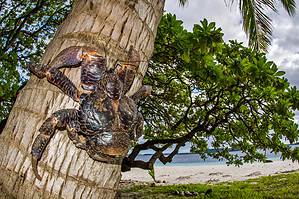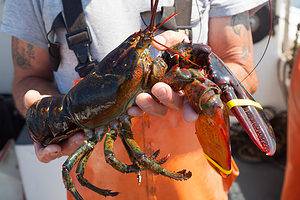Key Points
- Crayfish and lobster live in completely different places.
- Lobsters and crayfish are both crustaceans and invertebrates that shed their tough exoskeleton.
- The secret to a lobster’s longevity is believed to be due to telomerase – an enzyme that repairs DNA.
Crayfish and lobsters are often confused with one another, and it certainly doesn’t help when in some regions lobsters are called crayfish. It’s an easy mistake to make – after all, they do look incredibly similar. Both live in water and have hard exoskeletons and large pincers. But the truth is they are actually two completely different species.
But just how alike are they really? For a start, there’s a vast difference in size and they eat different things. However, possibly the most important difference is that they live in completely different places – one lives in the sea while the other lives in rivers and lakes. Join us to discover all of their differences and find out exactly which one lives where.
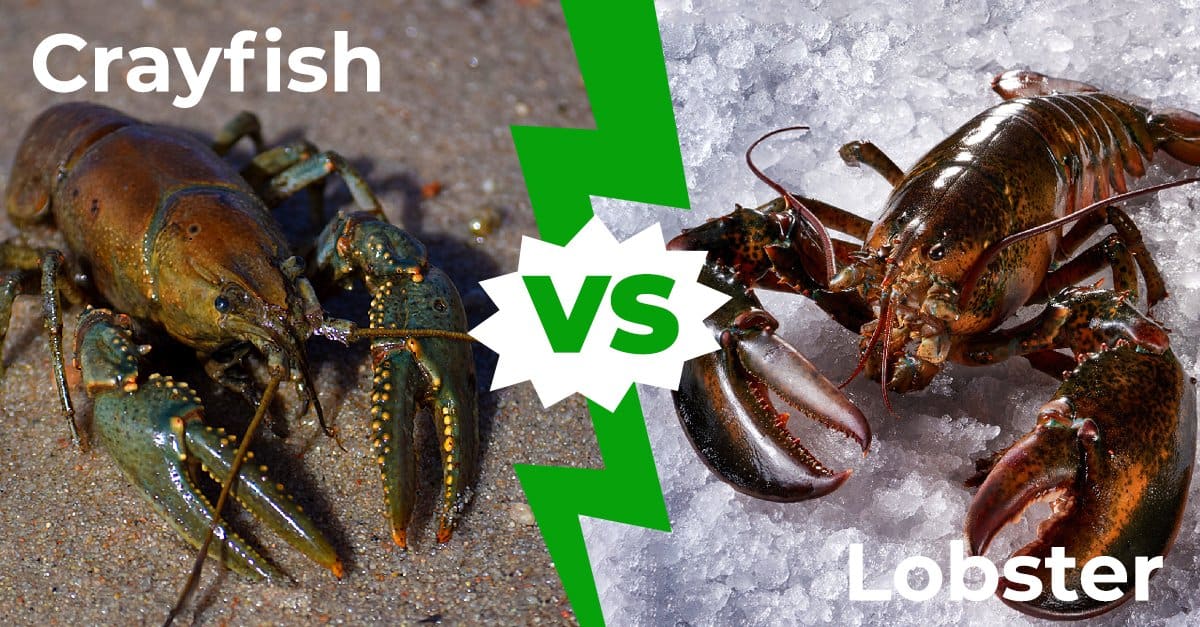
Comparing Lobster Vs Crayfish
Lobsters and crayfish are both crustaceans and invertebrates that shed their tough exoskeleton many times over the course of their lives. They’re also both decapods and have ten legs. So, if they’ve got so many things in common then you’re probably wondering if there are even any differences between them at all. Well, despite their similarities there are still some key differences, and some even make it easy to distinguish between the two.
Check out the chart below to learn a few of the main differences.
| Lobster | Crayfish | |
| Size | Usually 8 to 20 inches long | 2 – 6 inches long |
| Habitat | Saltwater – in all oceans on sandy and muddy bottoms | Freshwater – lakes, rivers, streams, ponds. Usually under rocks and in crevices at the bottom |
| Color | Usually greenish blue or greenish brown, but can be widely varied | Usually dark blue, dark green, or black |
| Diet | Small fish, snails, clams, mollusks, other small crustaceans | Insects, worms, plants |
| Lifespan | Up to 100 years | Between 3 and 8 years |
| Number of species | Around 30 true (clawed) lobsters | More than 640 |
The 5 Key Differences Between Crayfish and Lobster
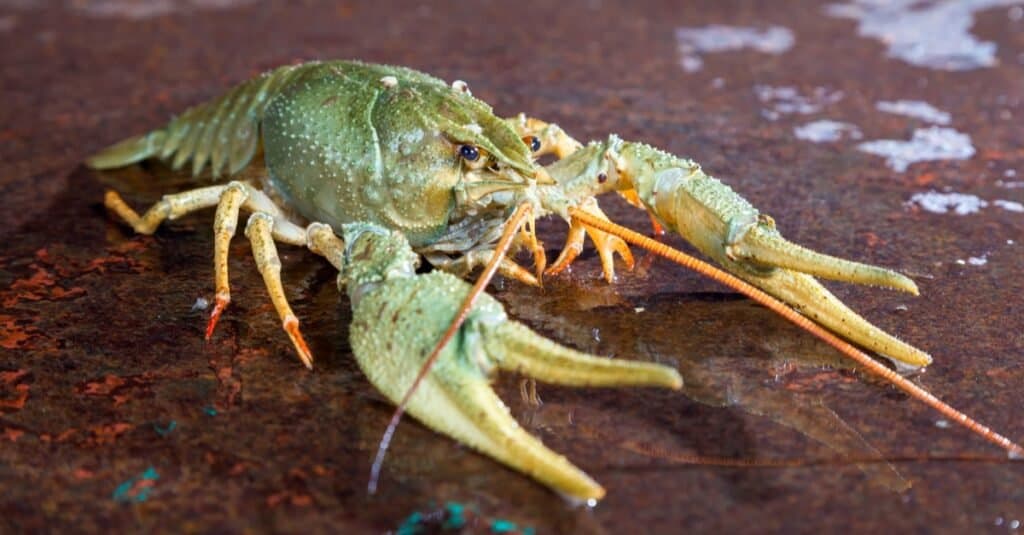
Despite their similar appearance, crayfish and lobsters are completely different animals
©Sergey Lavrentev/Shutterstock.com
Crayfish Vs Lobster: Size
One of the differences between crayfish and lobster is their size. Crayfish are much smaller than lobsters and range between 2 and 6 inches long. Lobsters are much larger and are typically between 8 and 20 inches long, but some can even be up to several feet in length.
Crayfish Vs Lobster: Habitat
The easiest way to tell the difference between lobsters and crayfish is to look at where are living. Crayfish live in freshwater rivers, lakes, ponds, and streams while lobsters live in saltwater in seas and oceans. However, both are bottom dwellers and like to lurk under rocks and in crevices on the muddy bottoms.
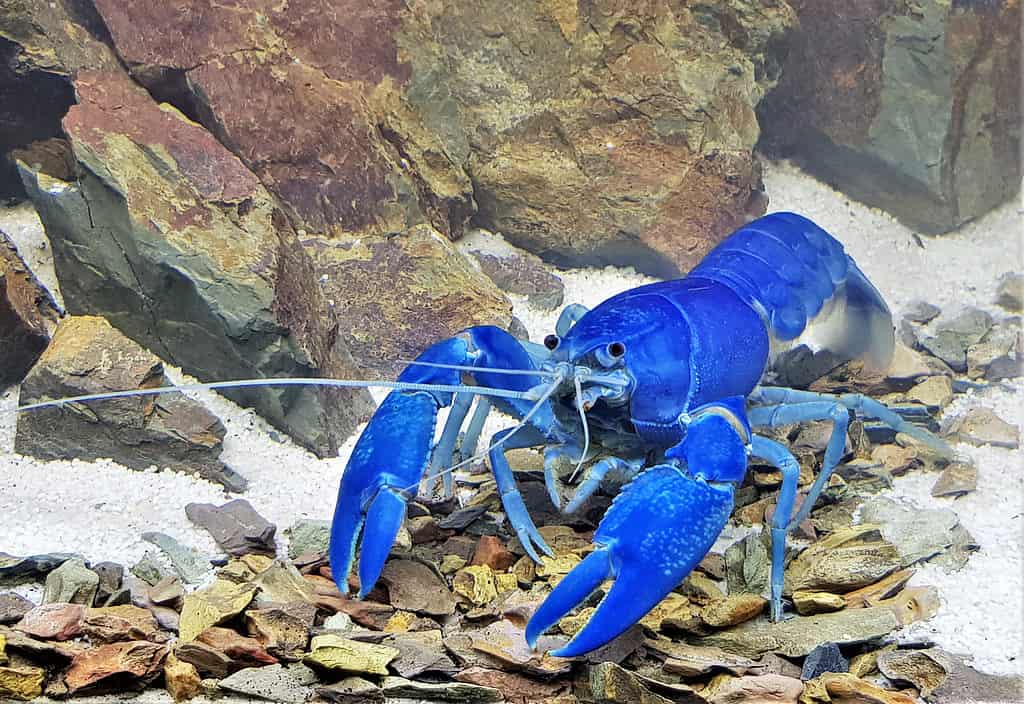
Lobsters come in a variety of colors, like this beautiful blue.
©Arunee Rodloy/Shutterstock.com
Crayfish Vs Lobster: Color
At first glance there isn’t much difference between the color of lobsters and crayfish – crayfish are dark blue, green, or black, while lobsters are greenish-blue or greenish-brown. However, lobsters can sometimes be seen in a wide variety of bright colors, including albino, red, orange, or blue.
Crayfish Vs Lobster: Diet
Crayfish and lobsters also have different diets, although they are both omnivores. Lobsters eat mainly small fish, mollusks, snails, clams, some plants, and other small crustaceans. Crayfish eat a mixture of plants, worms, insects, and dead plants and animals.
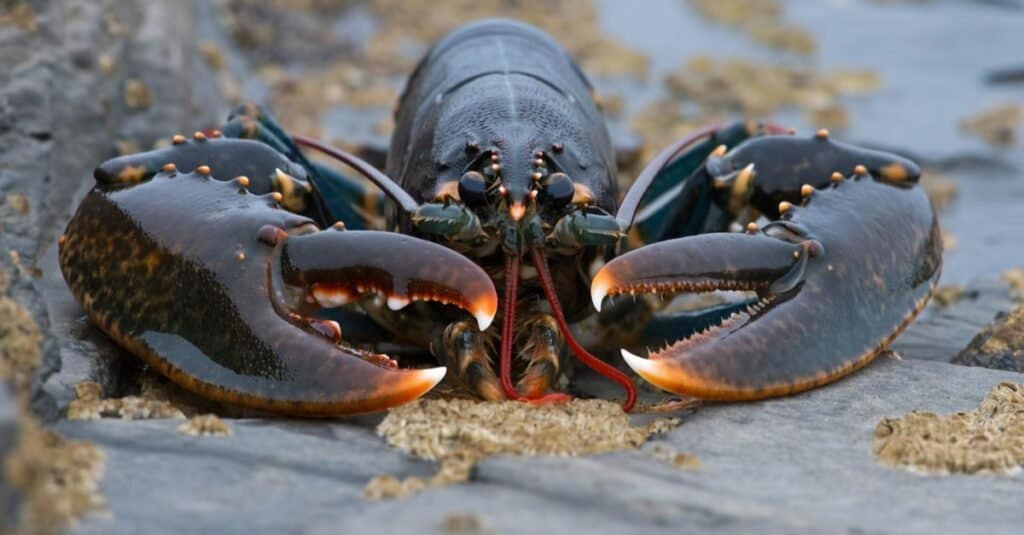
Lobsters are far bigger than crayfish and can live for up to 100 years
©davemhuntphotography/Shutterstock.com
Crayfish Vs Lobster: Lifespan
Lobsters and crayfish also have vastly different lifespans. Depending on the species, crayfish live for between 3 and 8 years. However, lobsters can usually live up to 100 years. Incredibly, some even far exceed that and the oldest lobster ever caught was estimated to be 140 years old. The secret to their longevity is believed to be due to telomerase – an enzyme that repairs DNA.
FAQs (Frequently Asked Questions)
Are Lobster And Crayfish From The Same Family Group?
No, lobsters are from the family group Nephropidae while crayfish are from four family groups – Astacidae, Cambaridae, Cambaroididae, and Parastacidae.
Are False Lobsters Really Lobsters or not?
No, although they share a name, reef, spiny, slipper, and squat lobsters are not true lobsters. Only clawed lobsters are classed as true lobsters. Reef, spiny, slipper, and squat lobsters are from different family groups to true lobsters and there are a number of differences between them, although the main difference is in their claws.
Can Lobster Survive In Freshwater?
No, lobsters need salt to survive and maintain the salinity of their bodies. If they are in freshwater for any prolonged period of time they will die.
Can Crayfish Survive In Saltwater?
No, although some species of crayfish are found in brackish water, they cannot survive entirely in saltwater.
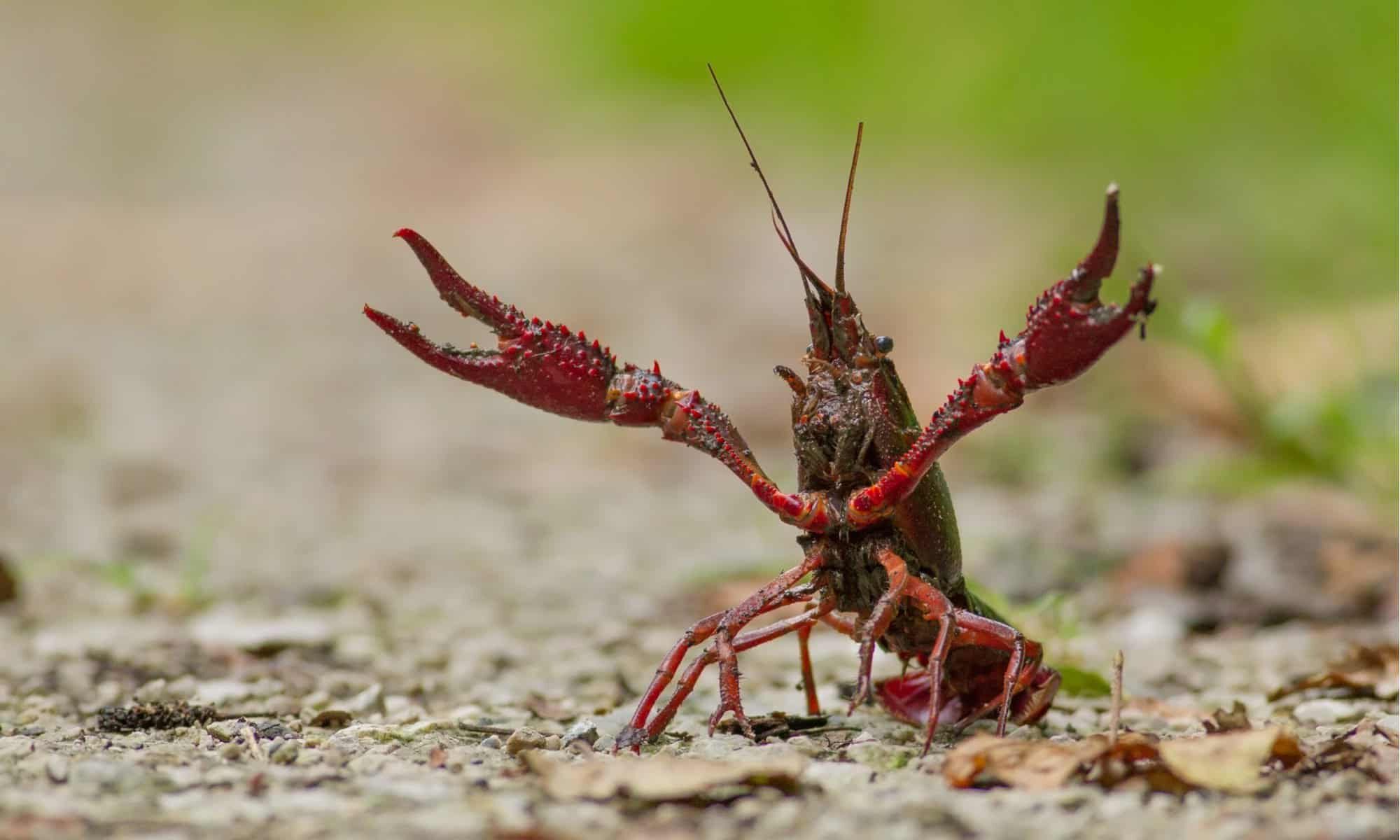
A male crayfish uses their claws by pinching or jabbing their rival.
©rugco/Shutterstock.com
What Are The Predators Of Crayfish?
The natural predators of crayfish are large fish, otters, raccoons, mink, and some large birds. Predators of their eggs and young are fish and other crayfish.
What Are The Predators Of Lobsters?
The natural predators of lobsters are varied as lobsters are found in so many different oceans, but some of them include large fish, eels, crabs, and seals.
Why Was It Once Thought That Lobster Can Live Forever?
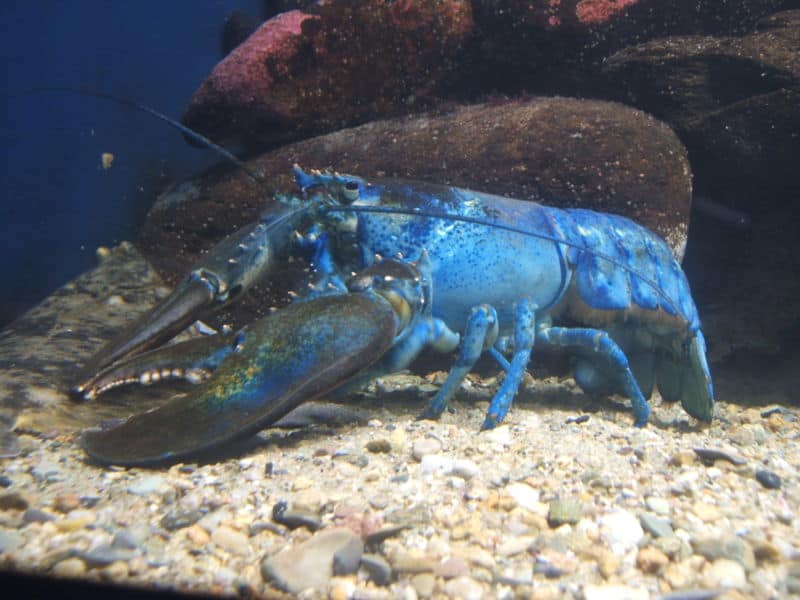
Lobsters never stop growing and shed their exoskeleton every few years.
Many people originally thought that lobsters were immortal because of a few things. The first is the presence of telomerase which is an enzyme that can repair DNA and cells that are lost or damaged each time they shed their exoskeleton. The second reason is that lobsters never stop growing and as adults, they shed their entire exoskeleton every two to three years.
Also, even as they age, lobsters continue to reproduce and don’t become infertile. However, lobsters do die eventually, and those at great ages die during a molt (when they are shedding their exoskeleton). This happens because it is too exhausting for them to shed such a large shell and they get stuck part way through and die.
Bonus: Can Lobsters Be Kept as Pets?
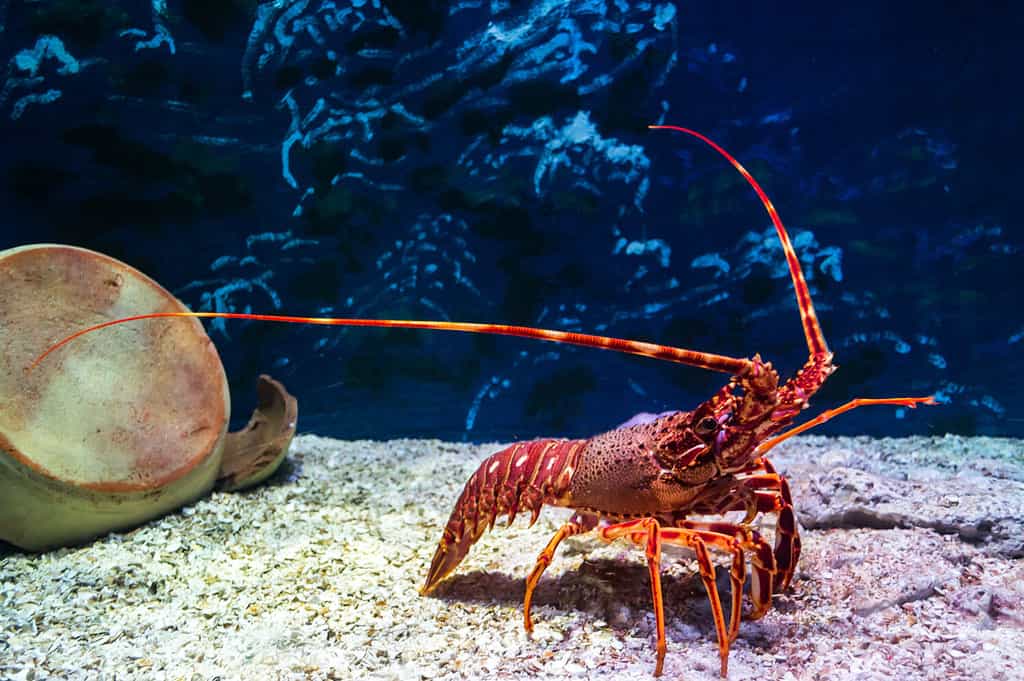
It is unusual – but lobsters can be kept as pets for experienced aquarists.
©Haland/Shutterstock.com
If you like to check out YouTube videos you may have seen Leon the Lobster – who was rescued from the grocery store and given a new life in a big aquarium with a doting human named Brady Bradwood. It would be great to save a doomed animal from life in a crowded aquarium with no food or hope for anything other than the boiling pot. If you have plenty of experience with aquariums and want to give a lobster a good home- here is what you need:
- A huge tank. The tank length should be at least five times that of the lobster. Larger is even better! Because they are bottom dwellers – the tank doesn’t need to be very tall.
- Moderate to strong water circulation. This will be necessary to create the same conditions as in the lobster’s natural habitat.
- Stable water parameters. This is important to keep from stressing the lobster and affecting its health. The water should be a constant 74-80 degrees F. The temperature shouldn’t fluctuate more than 2 degrees in 24 hours.
- Reef Tanks. Because lobsters need saltwater in their tanks, a good substrate to provide calcium, and a good filtration system – reef tanks are great for lobsters because of the calcium that corals leak into the water.
- Water changes. Perform regular water changes and filter checks daily. Change 10-20% of the water every 2 to 4 weeks.
- Hiding Places. Live rocks and caves for your lobster to hide in are necessary for a happy pet.
- Substrate. Crushed coral, dolomite or crushed shells are the recommended substrates for lobsters.
- Tank mates. Lobsters are very territorial and do not tolerate each other – so one per tank, please! Some fish that they are compatible with are angelfish, damsels, crownfish, tangs, butterflyfish, and dottybacks.
- Food. You can feed your pet lobster pellet food that sinks to the bottom of the tank. Lobsters will also enjoy frozen brine shrimp, tubifex worms, bloodworms, seaweed, and algae.
The photo featured at the top of this post is ©
Thank you for reading! Have some feedback for us? Contact the AZ Animals editorial team.




